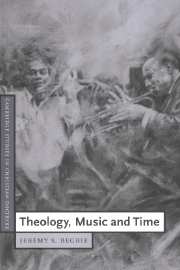Book contents
- Frontmatter
- Contents
- List of musical examples
- List of figures
- Acknowledgements
- Part I Introduction
- Part II In God's good time
- Part III Time to improvise
- 7 Boulez, Cage and freedom
- 8 Liberating constraint
- 9 Giving and giving back
- 10 Conclusion
- Bibliography
- Index of names
- Index of biblical verses
- General index
7 - Boulez, Cage and freedom
Published online by Cambridge University Press: 05 June 2012
- Frontmatter
- Contents
- List of musical examples
- List of figures
- Acknowledgements
- Part I Introduction
- Part II In God's good time
- Part III Time to improvise
- 7 Boulez, Cage and freedom
- 8 Liberating constraint
- 9 Giving and giving back
- 10 Conclusion
- Bibliography
- Index of names
- Index of biblical verses
- General index
Summary
[I]mprovisation on the piano is a necessity of his life. Every journey that takes him away from the instrument for some time excites a home-sickness for his piano, and when he returns he longingly caresses the keys to ease himself of the burden of the tone experiences that have mounted up in him, giving them utterance in improvisation.
Alexander Moszkowski, writing of Albert Einstein[J]azz is more closely related to the realm in which music occurs – time – than is European music … if music – as almost all philosophies of music hold – is the art expressed in time, then jazz corresponds more fundamentally to the basic nature of the musical than European music.
Joachim BerendtSpontaneity … is but the outcome of years of training and practice and thousands of experiments.
Stanley HauerwasA flurry of interest in improvisation marks the current musicological landscape. Though many aspects of improvisation are only scantily understood, some major studies have established it as a serious field of enquiry. This is partly because of a growing academic awareness in the West of various forms of non-Western music, whose techniques are often more dependent on improvisation than music of European provenance. Relevant also is the explosion of improvisatory practice in the arts of the twentieth century, and conversations between different types of improvising artists.
- Type
- Chapter
- Information
- Theology, Music and Time , pp. 179 - 203Publisher: Cambridge University PressPrint publication year: 2000



